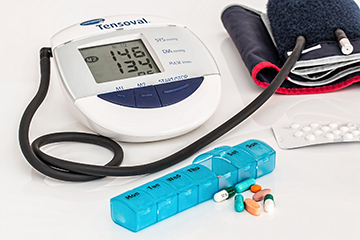Heart Awareness Month 2016
 September is Heart Awareness Month and this year on 29 September it will be Heart Awareness Day. During Heart Awareness Month we highlight the importance of looking after your heart by adopting a healthy lifestyle and seeking appropriate treatment.
September is Heart Awareness Month and this year on 29 September it will be Heart Awareness Day. During Heart Awareness Month we highlight the importance of looking after your heart by adopting a healthy lifestyle and seeking appropriate treatment.
Cardiovascular disease (CVD), or heart disease and stroke as it’s commonly known, is the second leading cause of death in South Africa, after HIV/Aids. Other causes of strokes include: infections such as TB meningitis, HIV, head injuries (as a result of alcohol/substance abuse, violence and accidents).
People are dying of heart disease at a younger age and our lifestyles are largely to blame for this growing problem.
Stroke is the third cause of death and is a leading cause of disability in South Africa.
Every hour 11 people in South Africa will suffer a stroke, that means about 270 strokes occur every day.
Here are some of the shocking statistics in South Africa:
- South Africa has one of the highest rates of high blood pressure worldwide: 1 in 3 adults.
- High blood pressure is a silent killer - 75% of people with high blood pressure don’t even know they have it.
- 1 In 5 children in South Africa smoke.
- 1 In 2 adults and a quarter of children in South Africa are overweight.
- 210 people die from heart disease every day.
- 80% Of these premature deaths can be prevented by eating better, moving more, and avoiding smoking.
Statistics show that at least 80% of premature deaths from heart disease and stroke could be avoided if the main risk factors, such as tobacco, unhealthy diet and physical inactivity are controlled.
The heart is one of the most important organs in the human body.
 Although we don’t have control over some of the risk factors associated with heart disease such as family history, sex or age — there are some key preventative steps we can take to ensure we avoid heart problems in the future.
Although we don’t have control over some of the risk factors associated with heart disease such as family history, sex or age — there are some key preventative steps we can take to ensure we avoid heart problems in the future.
Take the road to a healthy heart today and follow these preventative tips to get you started:
- Go for regular health checks and screenings at your local clinic.
- Maintain a healthy diet. Eat at least 5 portions of vegetables and fruits per day. Don’t forget to keep your body hydrated by drinking lots of water
- Adopt a heart-healthy lifestyle and quit smoking.
- Stay active and exercise regularly.
What is a healthy pulse rate?
For resting heart rate:
- Newborns 0 to 1 month old: 70 to 190 beats per minute
- Infants 1 to 11 months old: 80 to 160 beats per minute
- Children 1 to 2 years old: 80 to 130 beats per minute
- Children 3 to 4 years old: 80 to 120 beats per minute
- Children 5 to 6 years old: 75 to 115 beats per minute
- Children 7 to 9 years old: 70 to 110 beats per minute
- Children 10 years and older, and adults (including seniors): 60 to 100 beats per minute
- Well-trained athletes: 40 to 60 beats per minute
How to test your pulse
The pulse can be measured at areas where an artery passes close to the skin.
 To measure the pulse at the wrist, place the index and middle finger over the underside of the opposite wrist, below the base of the thumb. Press with flat fingers until you feel the pulse.
To measure the pulse at the wrist, place the index and middle finger over the underside of the opposite wrist, below the base of the thumb. Press with flat fingers until you feel the pulse.
Once you find the pulse, count the beats for 1 full minute. Or count the beats for 30 seconds and multiply by 2. This will give the beats per minute.
For more information on World Heart Day, visit the Heart and Stroke Foundation South Africa website
Other useful information:


